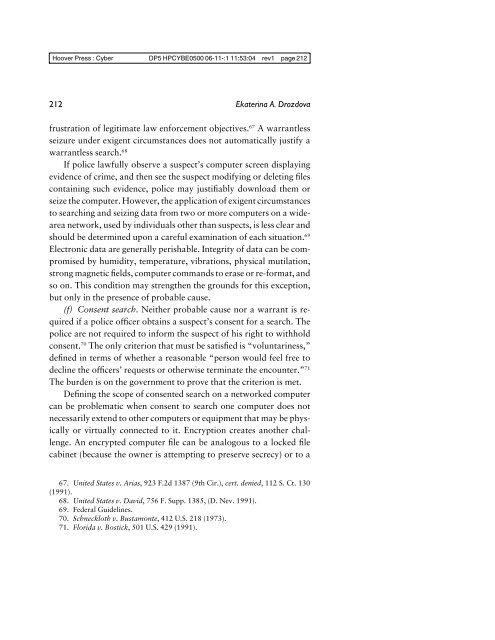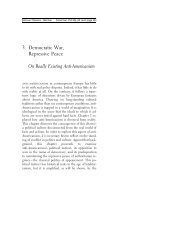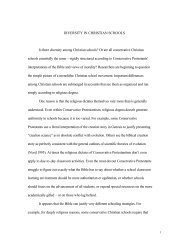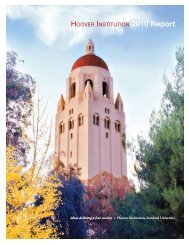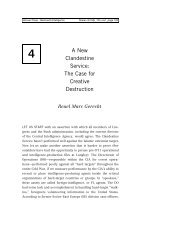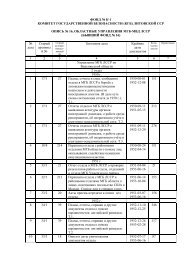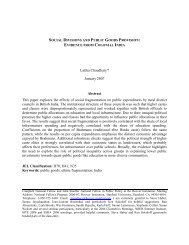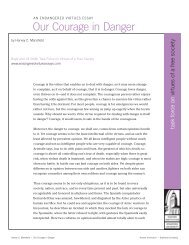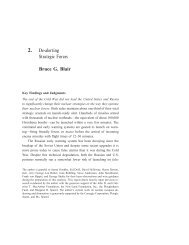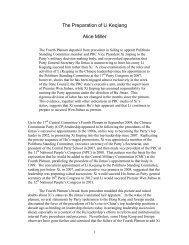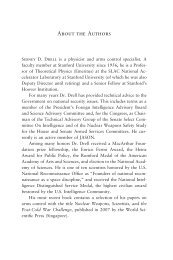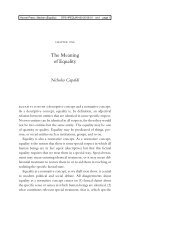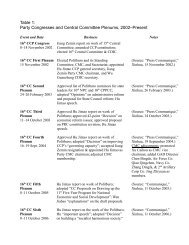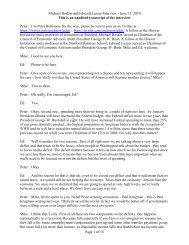Civil Liberties and Security in Cyberspace - Hoover Institution
Civil Liberties and Security in Cyberspace - Hoover Institution
Civil Liberties and Security in Cyberspace - Hoover Institution
Create successful ePaper yourself
Turn your PDF publications into a flip-book with our unique Google optimized e-Paper software.
<strong>Hoover</strong> Press : Cyber DP5 HPCYBE0500 06-11-:1 11:53:04 rev1 page 212<br />
212 Ekater<strong>in</strong>a A. Drozdova<br />
frustration of legitimate law enforcement objectives. 67 A warrantless<br />
seizure under exigent circumstances does not automatically justify a<br />
warrantless search. 68<br />
If police lawfully observe a suspect’s computer screen display<strong>in</strong>g<br />
evidence of crime, <strong>and</strong> then see the suspect modify<strong>in</strong>g or delet<strong>in</strong>g files<br />
conta<strong>in</strong><strong>in</strong>g such evidence, police may justifiably download them or<br />
seize the computer. However, the application of exigent circumstances<br />
to search<strong>in</strong>g <strong>and</strong> seiz<strong>in</strong>g data from two or more computers on a widearea<br />
network, used by <strong>in</strong>dividuals other than suspects, is less clear <strong>and</strong><br />
should be determ<strong>in</strong>ed upon a careful exam<strong>in</strong>ation of each situation. 69<br />
Electronic data are generally perishable. Integrity of data can be compromised<br />
by humidity, temperature, vibrations, physical mutilation,<br />
strong magnetic fields, computer comm<strong>and</strong>s to erase or re-format, <strong>and</strong><br />
so on. This condition may strengthen the grounds for this exception,<br />
but only <strong>in</strong> the presence of probable cause.<br />
(f) Consent search. Neither probable cause nor a warrant is required<br />
if a police officer obta<strong>in</strong>s a suspect’s consent for a search. The<br />
police are not required to <strong>in</strong>form the suspect of his right to withhold<br />
consent. 70 The only criterion that must be satisfied is “voluntar<strong>in</strong>ess,”<br />
def<strong>in</strong>ed <strong>in</strong> terms of whether a reasonable “person would feel free to<br />
decl<strong>in</strong>e the officers’ requests or otherwise term<strong>in</strong>ate the encounter.” 71<br />
The burden is on the government to prove that the criterion is met.<br />
Def<strong>in</strong><strong>in</strong>g the scope of consented search on a networked computer<br />
can be problematic when consent to search one computer does not<br />
necessarily extend to other computers or equipment that may be physically<br />
or virtually connected to it. Encryption creates another challenge.<br />
An encrypted computer file can be analogous to a locked file<br />
cab<strong>in</strong>et (because the owner is attempt<strong>in</strong>g to preserve secrecy) or to a<br />
67. United States v. Arias, 923 F.2d 1387 (9th Cir.), cert. denied, 112 S. Ct. 130<br />
(1991).<br />
68. United States v. David, 756 F. Supp. 1385, (D. Nev. 1991).<br />
69. Federal Guidel<strong>in</strong>es.<br />
70. Schneckloth v. Bustamonte, 412 U.S. 218 (1973).<br />
71. Florida v. Bostick, 501 U.S. 429 (1991).


